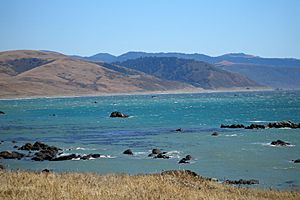Cape Mendocino facts for kids
Cape Mendocino is a special place on the northern Californian coastline. It is the westernmost point of the California coast, found in Humboldt County.
The cape got its name in the 1540s. It was named to honor Antonio de Mendoza. He was a very important leader called a Viceroy in New Spain, which was a large area controlled by Spain in the Americas.
History of Cape Mendocino
This area has been an important landmark for ships since the 1500s. Spanish ships would cross the Pacific Ocean using the Pacific trade winds. These winds and ocean currents, like the North Equatorial Current, helped them reach the North American coast.
After reaching land, large Spanish ships called Manila galleons would sail south. They traveled along the coast all the way to Acapulco in Mexico.
An English explorer named Francis Drake saw Cape Mendocino in 1576.
Later, in 1613, a Japanese diplomat named Hasekura Tsunenaga sailed from Japan to Cape Mendocino. He was on an important trip to meet the leaders of Spain and the Pope.
Earthquakes and Geology
The area around Cape Mendocino is known for having many earthquakes. For example, in April 1992, three large earthquakes happened near the cape.
Just west of Cape Mendocino, under the Pacific Ocean, is a special spot called the Mendocino Triple Junction. This is where three huge pieces of the Earth's crust, called tectonic plates, meet.
- The San Andreas Fault starts here and goes south. It is a type of boundary where two plates slide past each other. Here, the Pacific Plate and the North American Plate rub against each other.
- To the north, the Gorda Plate is slowly sliding underneath the North American Plate. This area is called the Cascadia subduction zone.
- To the west, the Mendocino Fracture Zone is another boundary where the Gorda Plate and the Pacific Plate slide past each other.
Images for kids
-
Antonio de Mendoza, the person Cape Mendocino is named after.
See also
 In Spanish: Cabo Mendocino para niños
In Spanish: Cabo Mendocino para niños
 | William M. Jackson |
 | Juan E. Gilbert |
 | Neil deGrasse Tyson |



